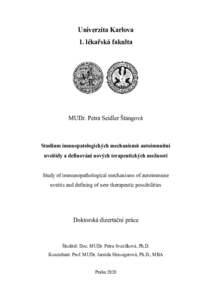Studium imunopatologických mechanismů autoimunitní uveitidy a definování nových terapeutických možností.
Study of immunopathological mechanisms of autoimmune uveitis and the determination of new therapeutical options.
dizertační práce (OBHÁJENO)

Zobrazit/
Trvalý odkaz
http://hdl.handle.net/20.500.11956/119279Identifikátory
SIS: 153375
Katalog UK: 990023755270106986
Kolekce
- Kvalifikační práce [4894]
Autor
Vedoucí práce
Konzultant práce
Heissigerová, Jarmila
Oponent práce
Rozsíval, Pavel
Farghali, Hassan
Fakulta / součást
1. lékařská fakulta
Obor
-
Katedra / ústav / klinika
Oční klinika 1. LF UK a VFN
Datum obhajoby
17. 6. 2020
Nakladatel
Univerzita Karlova, 1. lékařská fakultaJazyk
Čeština
Známka
Prospěl/a
Klíčová slova (česky)
antibiotika, bezmikrobní model, ciprofloxacin, cyklofosfamid, cytokiny, experimentální autoimunitní uveitida, C57BL, 6, metronidazol, mikrobiota, mikrobiom, mykofenolát mofetil, nitrooční tekutinaKlíčová slova (anglicky)
antibiotics, germ-free model, ciprofloxacin, cyclophosphamide, cytokines, experimental autoimmune uveitis, C57BL, 6, metronidazole, microbiota, microbiome, mycophenolate mofetil, intraocular fluidCílem této práce bylo získat nové poznatky o mechanismech autoimunitní uveitidy a testovat nové způsoby léčby, které nebyly u uveitid studovány nebo jejichž efekt je sporný. Hlavní důraz byl kladen na úlohu mikroorganismů v procesu uveitidy. K dosažení cílů byl využit myší model experimentální autoimunitní uveitidy včetně modelu bezmikrobního a byly analyzovány vzorky nitroočních tekutin pacientů. Na experimentálním modelu byla hodnocena intenzita zánětu in vivo klinicky a post mortem histologicky. Hodnocen byl efekt imunomodulační léčby. Intenzita zánětu byla porovnána mezi skupinami bezmikrobních a konvenčních myší. U konvenčních myší byl sledován terapeutický efekt antibiotik podávaných s cílem ovlivnit mikrobiom. Ve vzorcích nitroočních tekutin pacientů s autoimunitní uveitidou byly sledovány známky po proběhlém infekčním procesu a hodnoceny hladiny cytokinů a dalších faktorů. Zhodnocení efektu imunomodulační léčby prokázalo účinnost mykofenolát mofetilu, což podporuje jeho širší využití při léčbě autoimunitní zadní uveitidy v humánní medicíně. Snížení bakteriálního osídlení vedlo k poklesu intenzity zánětu, a tím potvrdilo význam mikroorganismů v procesu autoimunitní uveitidy, a to jak u bezmikrobních myší, tak u konvenčních myší léčených antibiotiky. Výsledky analýzy nitroočních tekutin podporují...
The aim of this work was to gain new knowledge about mechanisms of autoimmune uveitis and to test new therapeutic possibilities that have not yet been studied in uveitis or whose effect is questionable. The main emphasis was placed on the role of microorganisms in the process of uveitis. A mouse model of experimental autoimmune uveitis including a germ-free model was used to achieve the aims and samples of patients' intraocular fluids were analyzed. In the experimental model, the intensity of inflammation was evaluated in vivo clinically and post mortem histologically. The effect of immunomodulatory treatment was evaluated. The intensity of inflammation was compared between groups of germ-free and conventional mice. The therapeutic effect of antibiotics administered to affect microbiome was investigated in conventional mice. In intraocular fluid samples of patients with autoimmune uveitis signs of infection were monitored and levels of cytokines and other factors were evaluated. Evaluation of the effect of immunomodulatory therapy has demonstrated the efficacy of mycophenolate mofetil, which supports its wider use in the treatment of autoimmune posterior uveitis in human medicine. The decrease in bacterial load has led to a decrease in the intensity of inflammation, thereby confirming the importance of...
